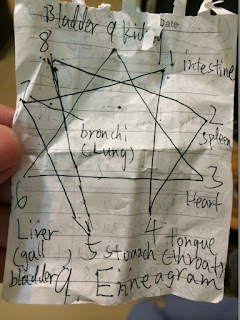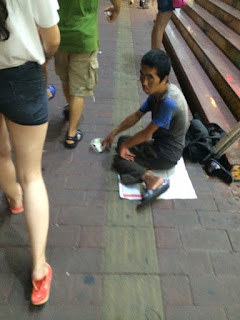I have had no lack of reading in China during these six
years. But it’s been a long time since I’ve read a heavy academic
general-interest book like Antifragile.
And boy was it a shock to the system when I started it a few weeks ago! The
language is deeper, ideas for potent and, if you’re not 100% focused on it, it
doesn’t go in. Reading Chinese kungfu novels are easier to follow than Antifragile. But perhaps it’s because of
a lack of that kind of reading. I
read the same authors books Black Swan
and Fooled by Randomness before I
came to China and, at least at the time, felt they were very consumable.
 The book seems to come from my family of thought so it didn’t
have too much challenge to my base assumptions. The person who lent it to me
apparently struggled with some of the left field propositions delivered with
bombast, self-righteousness and more than a dash of smugness. In a word, it’s
not a book that seeks to win over people. It is a book to smack people of a
different feather over the head, if they dared to venture in.
The book seems to come from my family of thought so it didn’t
have too much challenge to my base assumptions. The person who lent it to me
apparently struggled with some of the left field propositions delivered with
bombast, self-righteousness and more than a dash of smugness. In a word, it’s
not a book that seeks to win over people. It is a book to smack people of a
different feather over the head, if they dared to venture in.
It is part of a trilogy of his other books, linked and
mutually supporting. While this book introduces his idea of antifragilily, this book also summarises
and elaborates the concepts from his previous books, of randomness, black swans
and the metaphorical concepts he creates to explain them all. He has a whole
glossary of metaphors and self-made terminology that frame the phenomenon or
approach: Black swans, Extremistan, the Procrustean bed, Green timber problems,
iatrogenics and others. If I were to write a book of my thoughts, a glossary of
my takes on each word would be indispensable – and would drive readers equally
mad.
Black Swans weren’t his original metaphor, Karl Popper used
it to illustrate the idea of falsification rather than proof. He extended it to
talk about unexpected event with big
ramifications, which could potentially change everything. Before 9/11, not many
people would have thought to prepare for it. Before the GFC in 2007, no one
thought so many large companies could come to an end. These are two black swans.
We don’t plan for plain sailing; we should have our approach ready for the
storm.
I’d read Black Swan
before arriving in China and was amused in my first year in China that one of
the most interrogative students I’ve known (nicknamed Question Kevin for his
penchant of assailing teachers mid-hallway with inane, hair-splitting
questions) had read it as well but he couldn’t chew through the main point. I sat him down to share some thoughts but he didn’t
want to talk about it. Perhaps he had too many questions.
Randomness was a key principle in his first book, but there
is an extension of it his latest book, in regards to randomness, that applies
to my life now in a timely way. First to talk of the principle: almost
everything in life has a background randomness to it whether it be your heart
rate, your productivity, the China - New Zealand exchange rate and a wise
approach to life is to not be mentally oversensitised to fluctuations but also
see the benefits in fluctuations and randomness to things. Being able to deal
with and benefit from these is quintessentially what antifragility is about. Denial
of randomness or artificially stabilising things makes them fragile.
An analogy he usefully brings up in this book is that of the
employee versus the contractor: An employee has a very stable income, and if we
extrapolated it to retirement would be a quite a nest egg. A contractor’s
income is quite random and he knows it. He has to make or take his
opportunities, make the best of the income droughts and take full advantage
when it rains. It is plausible that he’ll have the same nest egg at the end of
it as the employee but it’s a rollercoaster getting there. But if an employee
loses their job, they’ve lost their income until they can find a new one. The
apparent stability is not true if a career black swan arises. A strictly
employment mindset is fragile. (Incidentally, I was watching the mini-series Mildred Pierce at the same time as
reading part of it, which made me think of people’s approaches to that other
historical Black Swan, the Great Depression.) The contractor by contrast might
thrive or even get stronger, which is the key thesis for the book: The contractor
may be more antifragile.
This taps into my future ahead because I’m again at the same
kind of crossroad I was at 11 years ago (almost to the day). I’d finished my
Diploma in Primary Education coursework and was sending out CVs and going to
interviews at primary schools and getting nothing. It took a series of events
that led me to become self-employed and having a very different kind of working
life (which, incidentally was ended by a black swan, but the experience
definitely made me stronger; my entreprise, however, was fragile.).
Currently I’m investigating all sorts of side projects and
contemplating a large one, all the while still applying for jobs to be an
employee. Of course, full-time employment doesn’t preclude side projects small
nor big (unless the contract says so). Before there are any houses or babies on
the way it might be good to experience being moderately cashed-up and
experimental with the coming year. Maybe it’s time where an antifragile
approach would be better.
 Back to the book, he was big on adding fragility to all
sorts of systems from decision making, health, medicine, nutrition – all very
random. He could quite possibly need a sedative. In terms of adding Randomness
to systems, my recent interest in the I Ching had a nice resonance with one of
his passing comments: “Finally the
ancients perfected a method of random draw in more or less difficult situations
and integrated it into divinations. These draws were really meant to pick a
random exit without having to make a decision, so one would not have to live
with the burden of the consequences later.”
Back to the book, he was big on adding fragility to all
sorts of systems from decision making, health, medicine, nutrition – all very
random. He could quite possibly need a sedative. In terms of adding Randomness
to systems, my recent interest in the I Ching had a nice resonance with one of
his passing comments: “Finally the
ancients perfected a method of random draw in more or less difficult situations
and integrated it into divinations. These draws were really meant to pick a
random exit without having to make a decision, so one would not have to live
with the burden of the consequences later.”
Randomness is only retained when intervention is seen as a
last resort, and it’s only tolerance and adaptation to randomness that gets us
to be antifragile. It has a ring of the Daode Jing, “Practice inaction and
everything will be done.” Another tie in.
In less philosophical life: We left our apartment almost a
week ago now, staying in the family home in Qingyuan. Tomorrow we’ll head back
to Guangzhou for the last time before we go to NZ. And in 10 days I’ll be waking
up to New Zealand time. Bring on the next step!

































